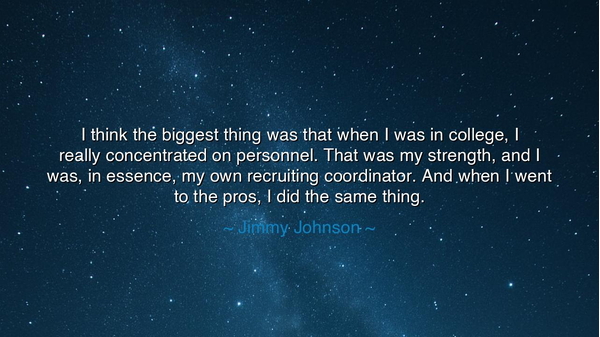
I think the biggest thing was that when I was in college, I
I think the biggest thing was that when I was in college, I really concentrated on personnel. That was my strength, and I was, in essence, my own recruiting coordinator. And when I went to the pros, I did the same thing.






Jimmy Johnson once declared: “I think the biggest thing was that when I was in college, I really concentrated on personnel. That was my strength, and I was, in essence, my own recruiting coordinator. And when I went to the pros, I did the same thing.” These words, though rooted in the world of sport, carry the weight of ancient wisdom. They remind us that greatness is not born of chance, but of vision—the ability to recognize the right people, the right spirits, and to bring them together into a force greater than any single individual.
The ancients, too, knew this truth. A king without wise counselors is but a blind man on a throne. A general without soldiers of discipline and loyalty is but a dreamer without an army. In Johnson’s tale, we see that his strength was not merely in tactics or in speeches, but in the deeper art of knowing men—seeing their talents, weighing their hearts, and assembling them into a unified whole. This is the work of a builder, not of bricks and mortar, but of souls and wills.
Consider the story of Pericles of Athens. Though he was no common soldier, he surrounded himself with strategists, builders, and thinkers of great power. By gathering the right personnel, he transformed Athens into a city of brilliance, raising the Parthenon and guiding his people through both war and prosperity. The lesson is the same: it is not enough to have dreams or even personal skill; one must choose and nurture the right companions, the right allies, the right team, if one is to transform vision into reality.
Johnson’s rise from college to the pros echoes this ancient pattern. When he recruited, he was not merely seeking athletes, but men who could bear the burden of a greater destiny. His championship teams were not built on raw talent alone, but on careful selection, unity, and the ability to place each man where his gift could shine. This is the hidden craft of leadership: knowing that victory belongs not to the strongest individual, but to the strongest collective.
But these words also carry a call to us, the hearers. Too often, we try to conquer life alone, imagining that our own hands, our own knowledge, our own effort will be enough. Yet wisdom teaches that our true strength lies in those we gather around us. The family we cherish, the friends we trust, the colleagues we choose—all of these are our “personnel,” and our success or failure depends on them as much as it depends on us.
Think of the great inventor Thomas Edison. Though his name is remembered, behind him stood countless assistants in his Menlo Park laboratory. Edison himself admitted, “I am not a great inventor. I am a collector of talent.” Without their shared genius, the light of invention would not have shone so brightly. Like Johnson, Edison knew that leadership is less about one man’s glory and more about the wise orchestration of many.
The lesson is clear and timeless: build your life as Johnson built his teams. Choose carefully those who walk beside you. Recognize your own strengths, but also see the strengths of others and place them where they can flourish. Do not be afraid to act as your own recruiter in life—seek mentors, allies, and companions who can help you reach higher than you could alone.
Therefore, let Johnson’s words be remembered not only by players of games but by all who would lead: victory belongs to those who understand people, who gather wisely, and who transform many into one. For empires, teams, and even families stand or fall not on the shoulders of one, but on the harmony of all. Build well, and your legacy, like his, will endure beyond your own time.






AAdministratorAdministrator
Welcome, honored guests. Please leave a comment, we will respond soon